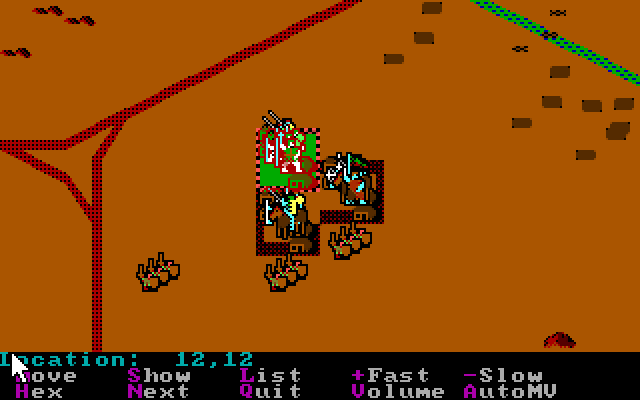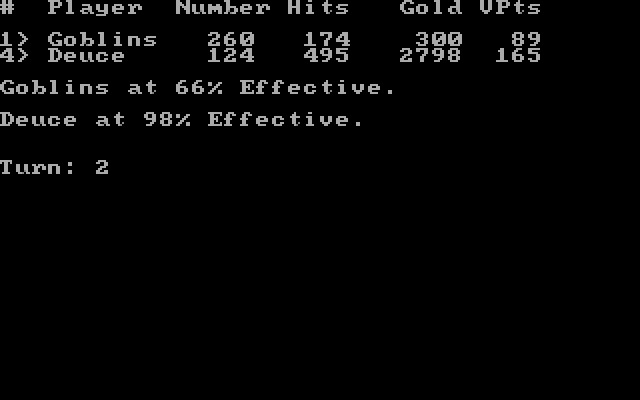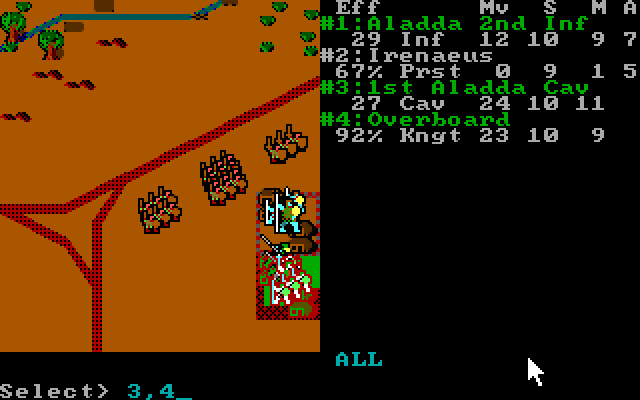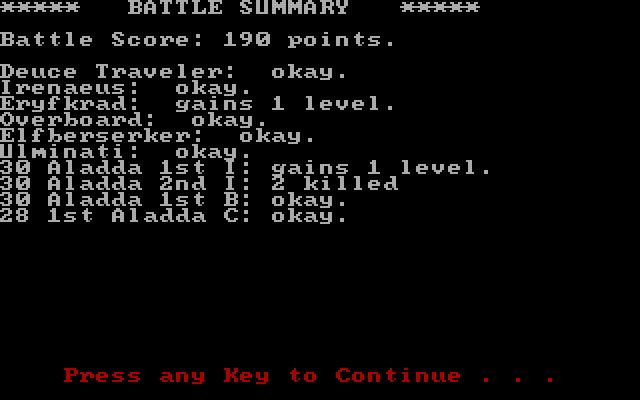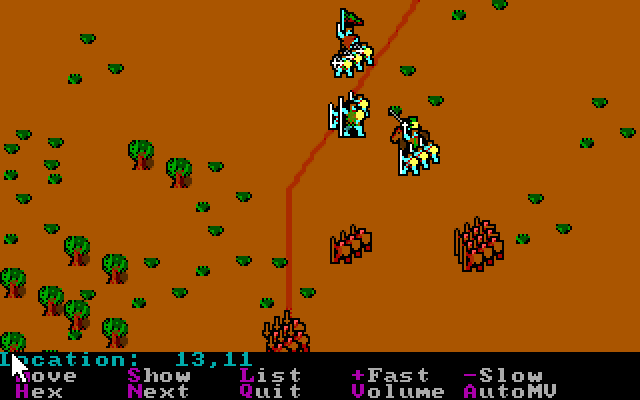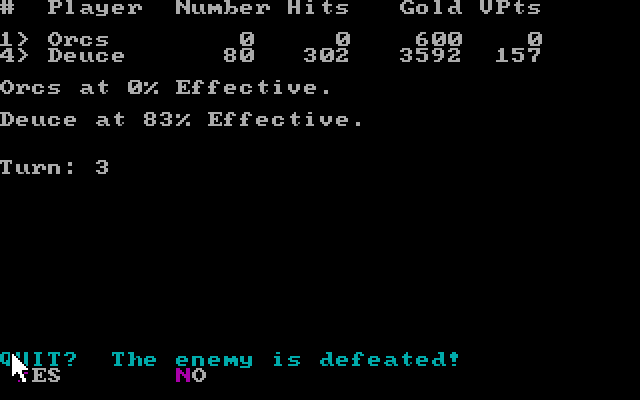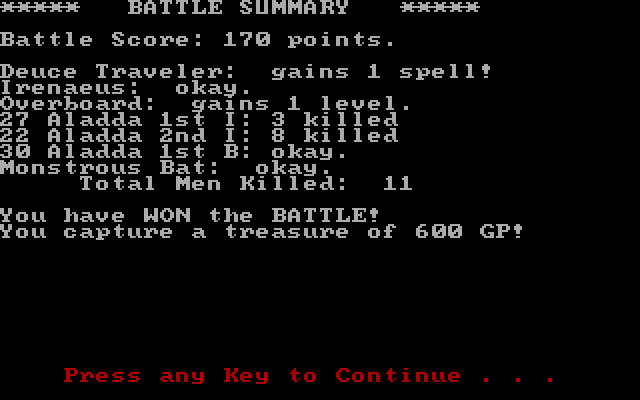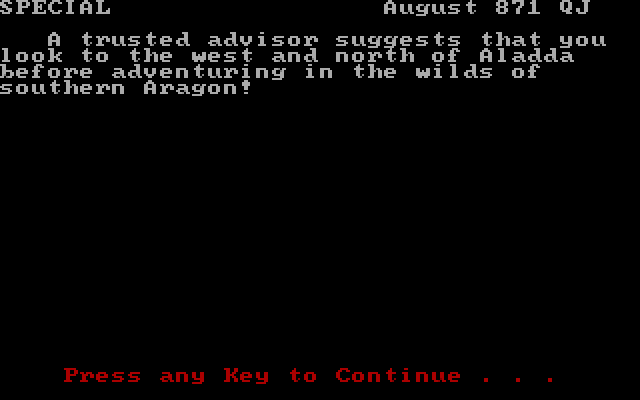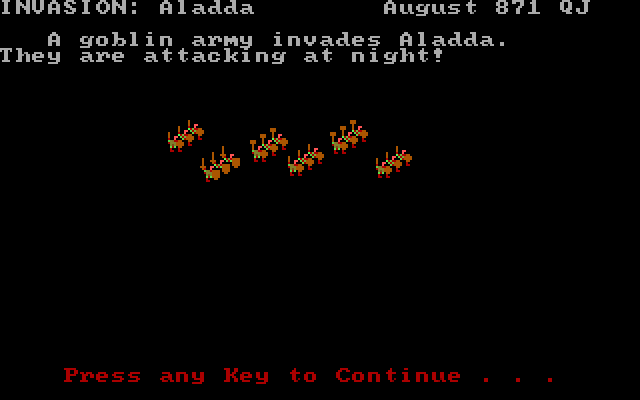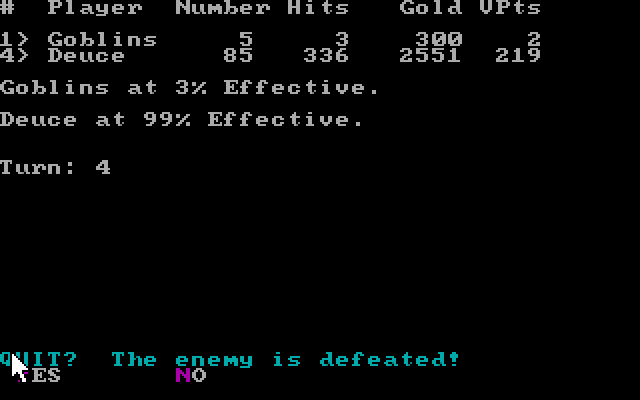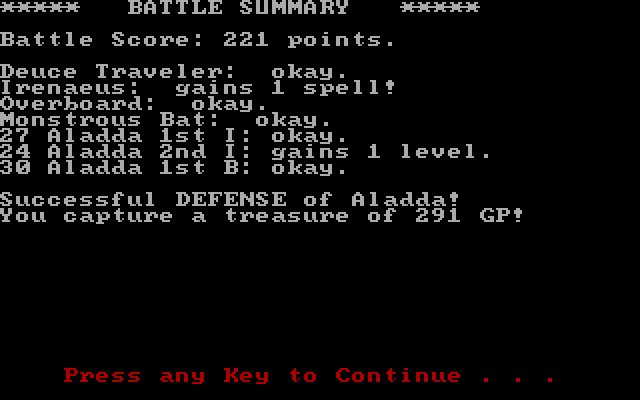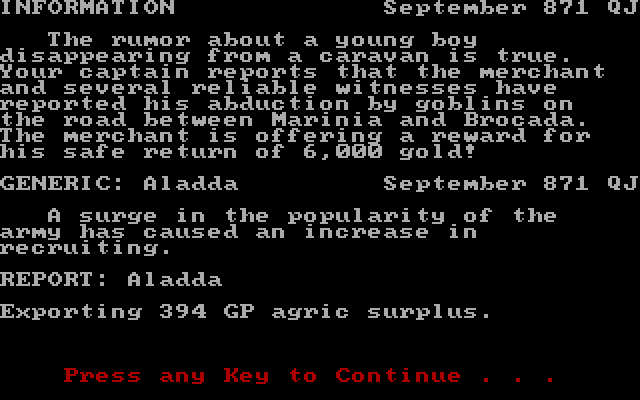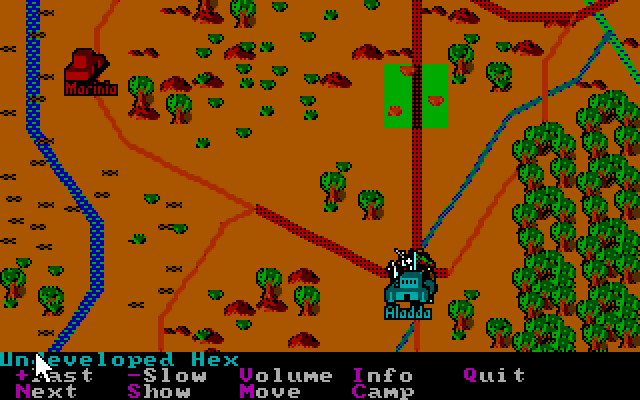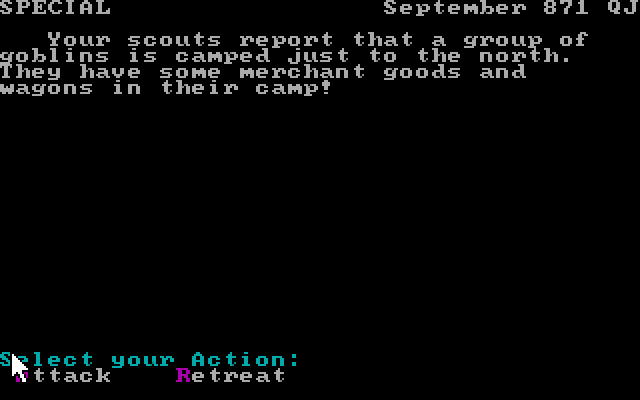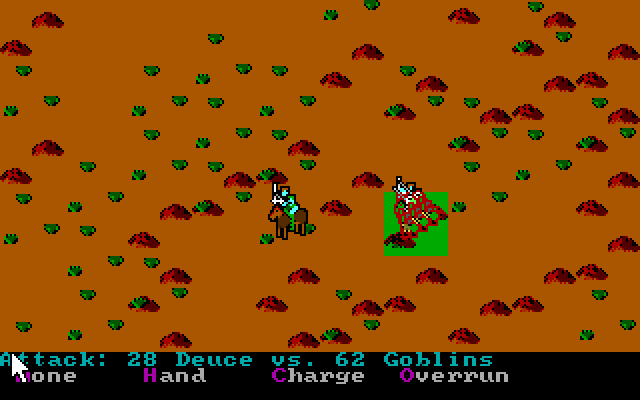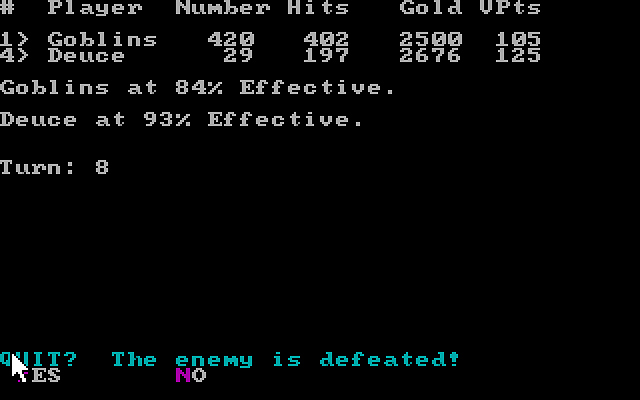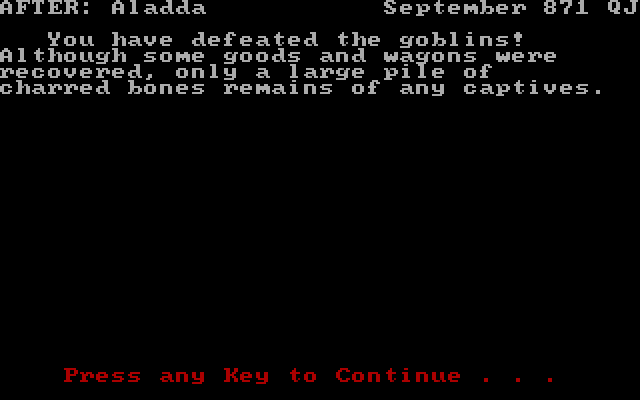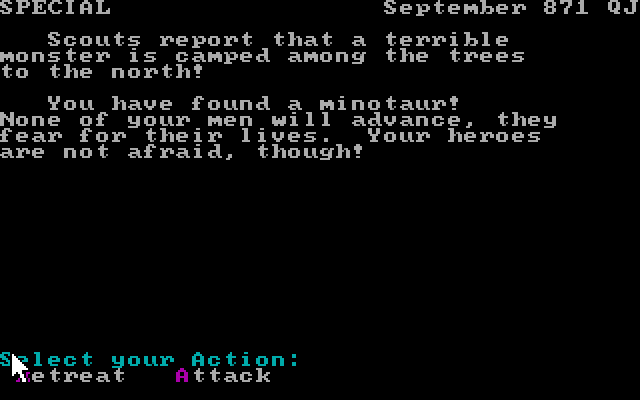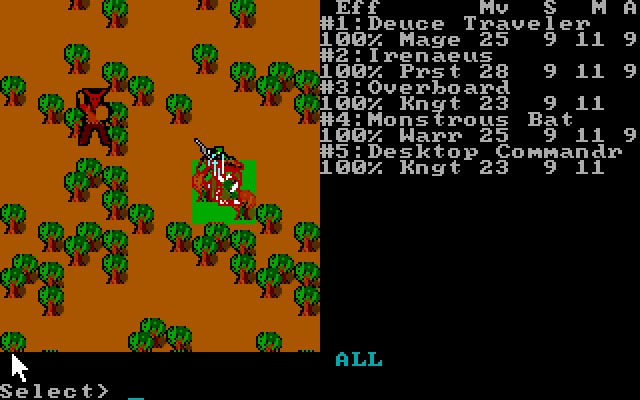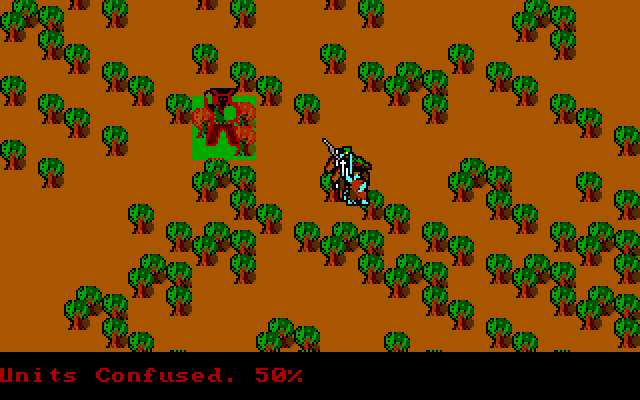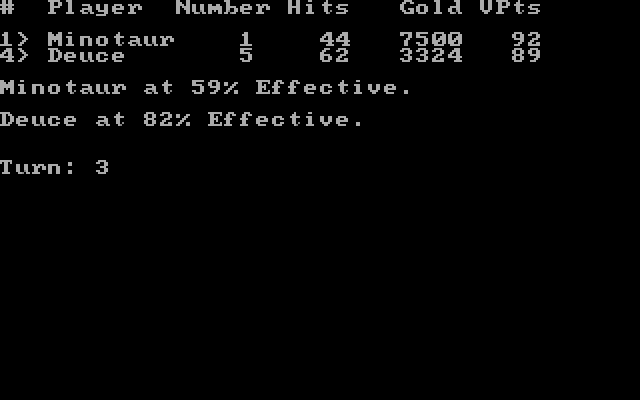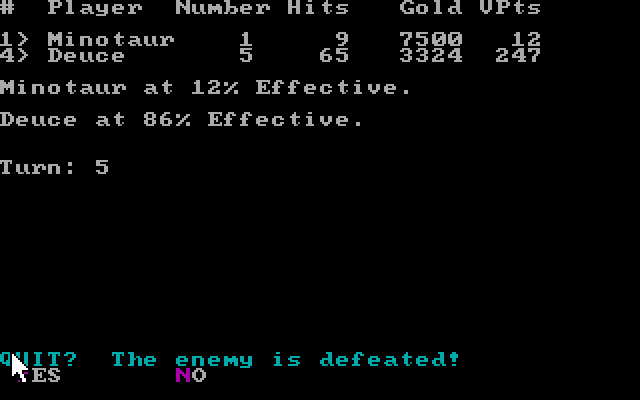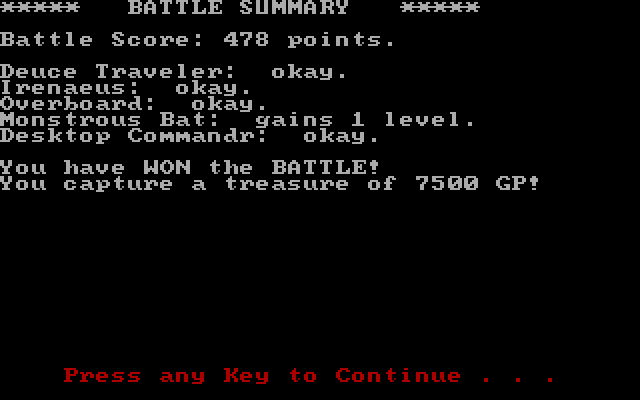
I've been toying around with an awesome game called Sword of Aragon. It is a strategy roleplaying game published by the once great and fallen SSI company in 1989. You play a young duke trying to reconquer his father's splintered realm, before going forth and conquering surrounding lands. The game is split between heroes and the armies that they lead, with a sprinkling of city management in between. Hordes of enemies attack you and your cities with allied generals fighting back with their forces, but occasionally your heroes have to venture by themselves to complete smaller quests.
This will be my fourth time starting the game. I will play the main character, but I will create my generals using volunteers from RPG Codex. As long as there is interest, I will continue the LP. Else I might just try a quickly completed playthrough so that I may write a review of it for Tacticular Cancer.
Overview from the Game Manual:
The Duke of Aladda has died and left his last will and testament to you, his only child and heir. The Duke's legacy is a gallant one, replete with deeds of valor in the defense of Aladda. By dint of his efforts, the former capital of the western realm of the Aragonian Empire has returned to a proud state. It is your father's deepest wish that you once again extend Aladda's dominion and eventually sit on the emperor's throne in the city of Tetrada. Executing your father's will properly means raising and equipping an army, then venturing forth to do battle against the dastardly foes threatening Aladda and its surroundings. You may be called upon to slay monsters, march against the demonic rulers of the Eastern realms; even to defend Aladda against the plundering appetites of Orcan armies. Fortunately, the rewards of success are great. So, assemble your army wisely, and campaign with vigor. May good fortune once again shine upon Aladda and the lands of Aragon. Your success in Sword of Aragon is determined by your allocation of precious resources, military planning and combat maneuvers. Knights, priests, warriors, mages, rangers, cavalry, infantry, and bowmen, plus the collected population of Aladda, await your commands.
More info from the manual:
The History of Aladda, As told by the Court Historian
Twenty years ago, Aladda was a miserably poor land, a pale reflection of its former glory as capital of the western half of the once-mighty Aragonian Empire. Its people were terror-stricken, though the land itself was rich in resources: fertile soils, abundant forests, and varied mineral assets graced the surrounding areas. In its weakened state, Aladda was also an easy mark for an array of monsters who periodically raided its territory, stripping the land of its sustenance. On the rare occasions that Aladdans resisted these incursions, bravery met evil and was overcome.
Then one day the humiliations came to an end. A band of fiendish goblins ransacked the village with plunderers' glee. Pillaging and looting, publicly humiliating residents, the horde now prepared to take its leave. Suddenly, two riders appeared on a hill south of the village: a knight and his squire. The tall knight rode a giant warhorse and raised his lance high in the air. The knight and his horse were both draped in dusty, worn - and sturdy mail armor. For a few moments, the knight and his loyal squire sat motionless. Both raiders and peasants were transfixed by the sight. The knight lowered his lance and put spurs to his mount's flank. He charged down the slope directly at the startled mob.
At first, the Goblins did nothing, paralyzed at the sight of the attacker on his furious charger. Once they realized that this man was for real, they drew their weapons and scattered. The marauders' fate was already sealed. The villagers watched in amazed delight as their mysterious champion cut a swath through the fleeing Goblin horde. None was spared the knight's righteous wrath that day.
In gratitude, the villagers cared for the knight's wounds and the needs of his squire. When the knight recovered, a delegation from the village approached him with a proposal. They offered their undying allegiance in return for the knight's pledge to lead and protect the village.
The brave young knight accepted the villagers' proposal. Some say it was a sacred vow that he took to protect all who are weak. Others believed that the pretty young maid who nursed him back to health was truer inspiration for the knight's decision. The maid became his bride, and after a proper amount of time had passed, the noble pair were blessed with a child: You.
The knight began his work in earnest, but soon found that slaying a horde of goblins is easier than dealing with the multitude of daily problems that confound a land. There were many frustrations and many setbacks. There were more raids by creatures that roamed the wilderness, but the knight and his small but growing force of soldiers repulsed them. Under his leadership, Aladda moved towards a happier reality. Before long, the people began calling him "The Duke" of Aladda. Throughout your childhood, Aladda prospered. As your father's prowess in battle grew, he gained knowledge of both nearby and faraway places. The Duke's scribes recorded bits and pieces of information about foreign lands brought by travelers to Aladda. His spies and scouts ranged far and wide, collecting information on all facets of these lands, from their customs and histories to their economies, politics, and military potential.
As you approached adulthood, the Duke provided you with a formal, well-rounded education - along with intensive military training. He hired a number of teachers from distant lands to instruct you in the arts of diplomacy and leadership. Your father's personal example amply reinforced your scholar's diligent efforts. Over time, the Duke's plans and dreams have gradually been revealed to you. It was his fondest hope that Aragon would one day regain the glory of bygone days when the blessings of civilization were known to all the people of the realm. Cities prospered, their residents free from the encroachment of marauding creatures. The citizens prospered through industriousness and individual initiative. Alas, your father will not fulfill his dream. An Orc raiding party surprised your father's forces, pressing into the village itself. At a critical moment, the Duke arose in fury, surpassing his previous martial deeds. Orc after orc fell before his blade. The battle was nearly won when a priest of some hideous, orcish deity managed to cast an evil enchantment upon the Duke and slew him! The remnants of the orcs then withdrew, presumably to find reinforcements for a final battle against Aladda and its people.
And so the mantle of leadership has been literally thrust upon your shoulders, years before you'd planned. The hardwon gains of your father are in your hands. Your success depends on wise choices - and the element of chance. In this time of trial, your father's testament and journal - and a cast of able advisors - will guide you. You have 80 soldiers plus your father's wealth to help you realize your destiny! Praise the Aladdan cause!
Notebook of the Duke of Aladda
The History of the lands of Aragon in centuries past The land of Aragon, which lies in the northeastern corner of the continent, is isolated by forbidding deserts, impassable mountains, and unfordable rivers. The vast majority of the land is lightly populated or completely uninhabited. Only a few population centers dot its imposing terrain. Most of the humans that dwell in the land of Aragon live in an uncivilized state. Such was not always the case. Almost nine centuries ago, Justinid I established the Aragonian Empire, uniting the existing Eastrealm and Westrealm, and forming treaties of alliance with the existing elves and dwarves of Aragon. The resultant Aragonian Empire flourished for centuries. The rich lands provided bountiful harvests both to feed the large population and to export overseas. The lush forests provided materials for a great merchant Armada that conducted trade throughout the known world. The Luftgar Mountains that bisect the land from north to south contained vast mineral resources. An industrious populace learned how to exploit these resources effectively.
A succession of wise and gifted rulers continued the rich legacy of Justinid I. They utilized their governing skills and theland's natural resources to the peoples' benefit. The land thrived and the people were happy and contented. Alas, the abundance of Aragon attracted the notice of the fiendish monsters that inhabited the surrounding wilderness. The soldiers of the empire were increasingly called upon to fend off raids by the hordes which attacked. Though it was noticed by few at the time, this frequent fighting drained the vitality of the nation. As the invaders became more numerous and powerful, discord broke out among the ruling classes. Nobles turned against their Emperor as disputes arose over royal protection of vassal states. The authority of the Emperor waned, and in some areas he ruled in name only.
In 523 QJ, Emperor Thorivid was assassinated, leaving no heirs. Governor-General Brethon of Tetrada laid claim to the title of Emperor for himself. There was strong opposition from the southern provinces, the cities of the Westrealm seceded from the Empire, and civil war ensued. The cities in the west fought amongst themselves over petty disputes. Years of countless bloody battles in Eastrealm left the factions still at odds, but stalemated in their mutual hostility. The fearsome Brethon initiated what were later called the "Years of Chaos." Rare is the leader who moves History according to his designs, yet so it was with Brethon.
Luckily, the Tetradan despot met an unhappy end at the hands of his kinsmen. Just as the conflicts were abating following Brethon's death, the "Year of Disaster" brought floods, and then, drought in 527 QJ. The resulting starvation and disease took the lives of thousands of the ancient Aragonians. Matters further deteriorated with the advent of the "Years of Horror." First, the Justinid Pass fell to the Zarnix Orcs, a huge "harol" that swept down from the mountains and overwhelmed the weakened defenders clinging to their strategic fortress guarding the pass. Then, hordes of titans led by a charismatic mage joined with masses of goblins to form an invincible and hideous army, which rolled across the lands, engulfing and destroying everything in its way. Tetrada fell to the horde in 531 QJ and the wealth of the Aragonian Empire was lost to the monsters.
Thus, the ancient empire fell and was stripped of much of its accumulated riches. The lands of Aragon have been in darkness during the three centuries since the "Three Catastrophes." Only now are some cities returning to a semblance of the civilization known in ancient times. Legend has it that the ancient emperors had always possessed three symbols of authority that signified the ruler of all Aragon. Two of these items, the Scepter of the East and the Crown of the West, were lost when the Goblins and Titans virtually destroyed ancient Tetrada in the final battle of the Year of Horror. The Amulet of Aladda had also vanished, but legend has it that before his painful death from an administered poison, Justinid XVI sent the Amulet away from traitorous Brethon's reach. The location of these items is today an intriguing mystery.
Our city info:
NAME Aladda
POPULATION 1,500
LOCATION Northwest Aragon, on Garrish River
RESOURCES Lumber, minerals, rich soil
ECONOMY Farming, some commerce along the river
RULER You
The inhabitants of Aladda are descendants of a highly industrious people who once possessed one of the highest standards of living in the Aragonian Empire. The resources of the area will provide a strong economic boost. Agricultural potential is strong because of the fertile soil and a temperate climate.
Aladda occupies the broad, fertile plain between the Luftgar Mountains and the Garroth River. The navigable Garrish river bisects Aladda into an eastern and western section. Rather than divide the region, the river serves to glue the area together politically and economically.
Beyond the plains in the east sit the luxuriant forests of the Tranavan Forest. The land to the west slopes up toward the hills, forming the margin of marshland tracts near the Garroth River.
----------------
octavius and commie will probably lecture me, but I am planning on playing a wizard so I can check out the spells. The lead character starts at a higher level, and so he has the best chance of reaching advanced spells first. On the other hand, I will miss out on being able to purchase certain units on the cheap. If I was a warrior I would get a discount on infantry, a knight on cavalry, and a ranger on bowmen.
Heroes can die in this game. If your character dies you can create a new one at the starting level. Each Codex volunteer will get to pick his character class from the following list of five from the manual:
Warrior: A tough fighter with moderate attack and defense capacity.
Knight: A fearsome mounted man, a well-equipped knight inflicts heavy damage and absorbs the same.
Ranger: Less suited for combat than a warrior or knight, rangers also have spell casting ability.
- Spells in order of character level: Grow, Dry, Light, Wither, Mud, Vigor, Rally, Xhaust, Heal, Fear, Bridge, Tower
Priest: Primarily healers, but priests can also cast invigorating spells. A priest's restorative powers are vital to damaged unit's restoration.
- Spells in order of character level: Vigor, Light, Rally, Xhaust, Bless, Heal, Fear, Prayer, Tower, Quake, Cure, Disintegrate
Mage: This magic-user is effective at befuddling armed opposition. The mage is ideal for softening up the opposition for your troops.
- Spells in order of character level: Light, Slow, Confuse, Fear, Mud, Bridge, Haste, Pyro, Quake, Teleport, Distintegrate, Gate
-----
War Council:
Kashmir Slippers, Priest, Level 9, Stationed at Tetrada
SCO, Warrior, Level 1, Killed at the Battle of Paritan
SCO, Warrior, Level 13, Stationed at Tetrada
Jester, Priest, Level 5, Stationed at Tetrada
-----
Time to get started. We only have one turn before the hordes return to finish the city off. I will take suggestions on what units to purchase first. We can start with Infantry (cheap, but not very mobile), Mounted Infantry (expensive), Cavalry (very expensive, fast, poor archery), Bowmen, a (awesome units, can hit all enemy in a stack, relatively cheap) and Mounted Bowmen (most expensive).
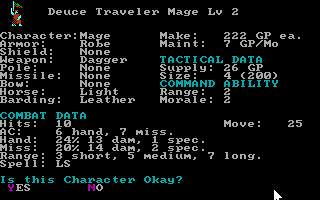
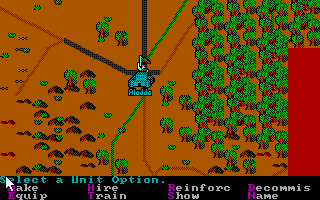
The enemy will come from the west. The section of orange blocks to the east are unexplored lands.
Last edited:
























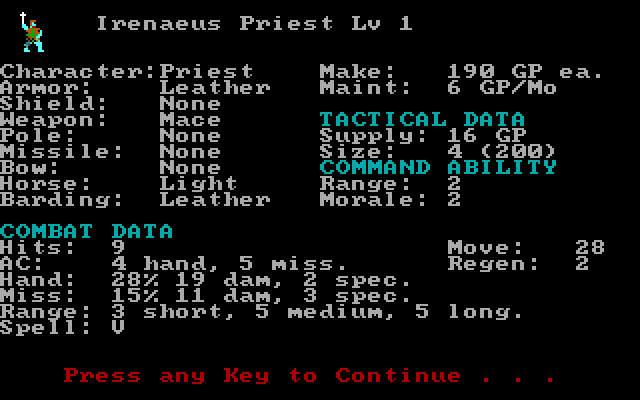

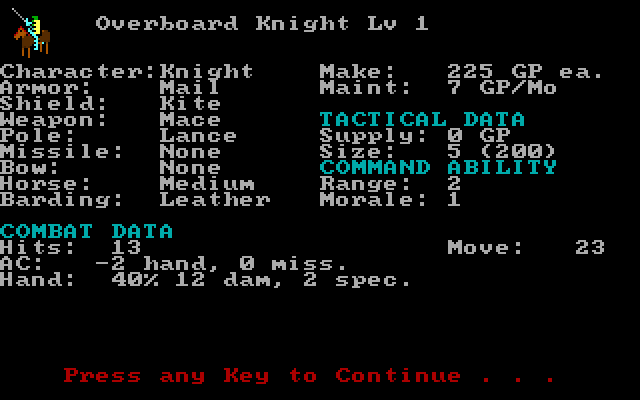
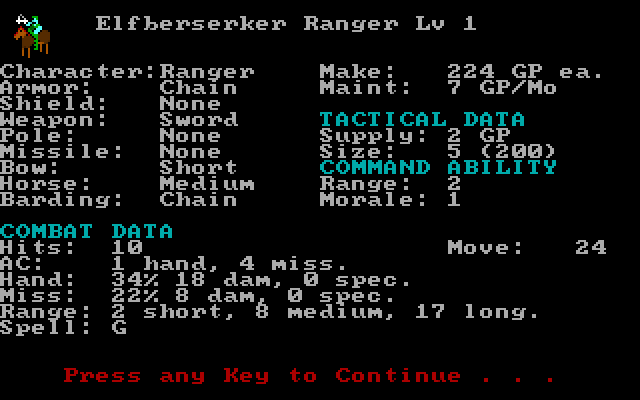
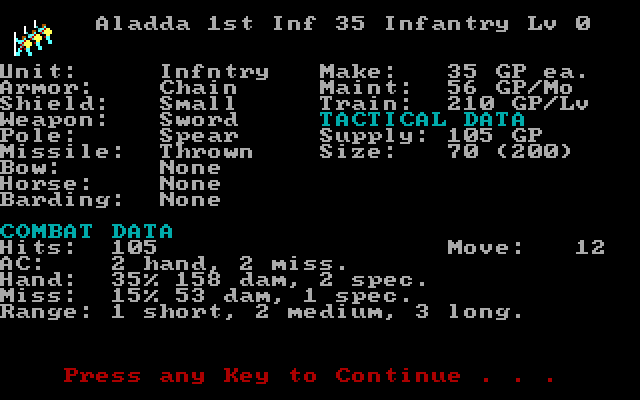
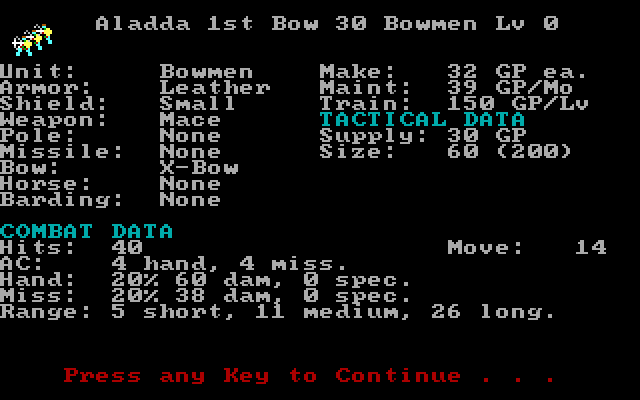
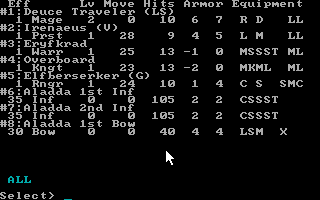

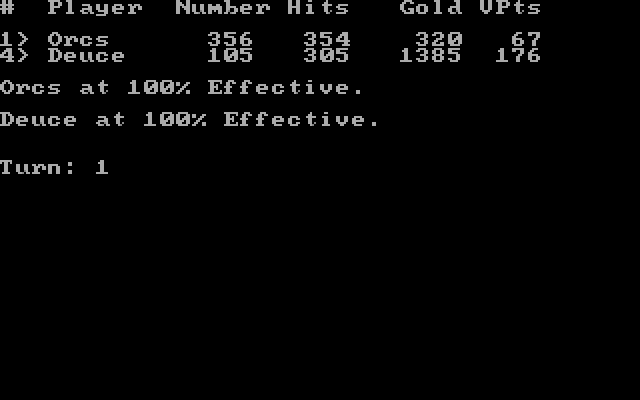

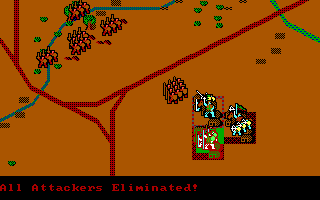
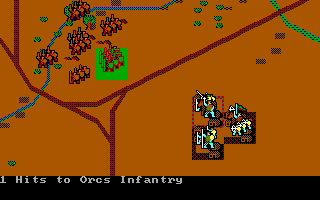
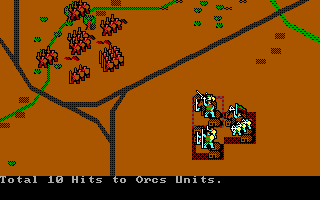
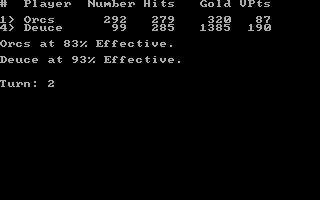
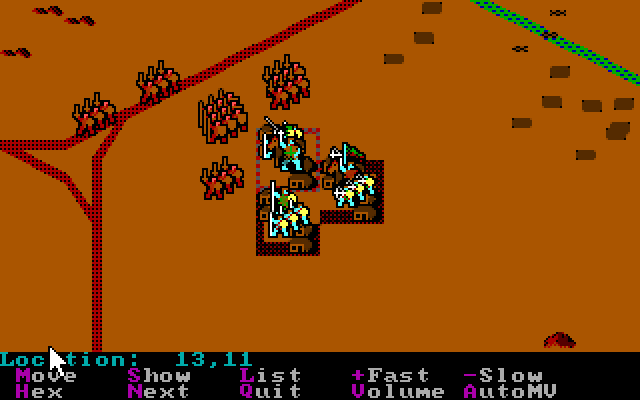



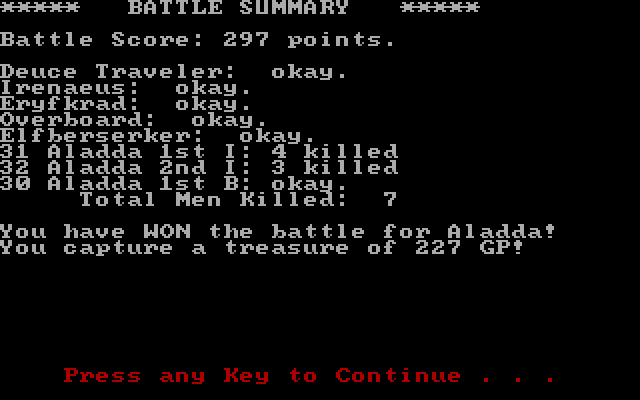
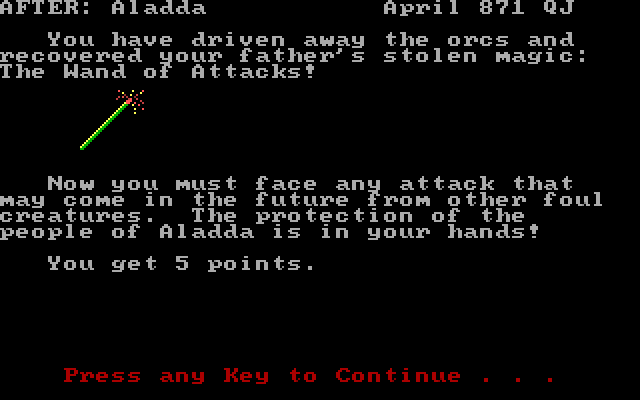
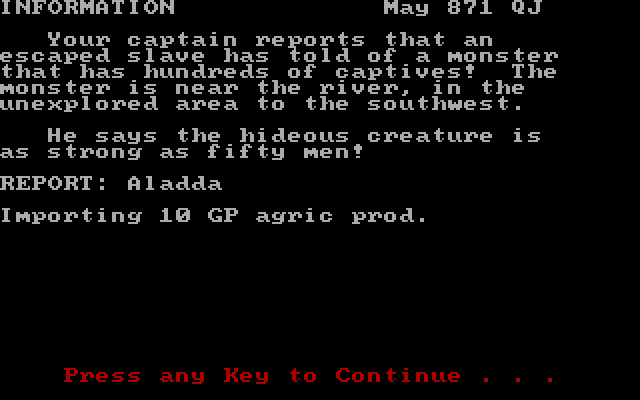
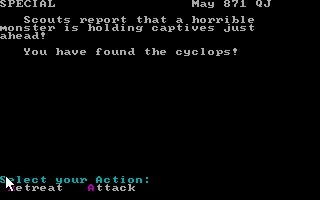
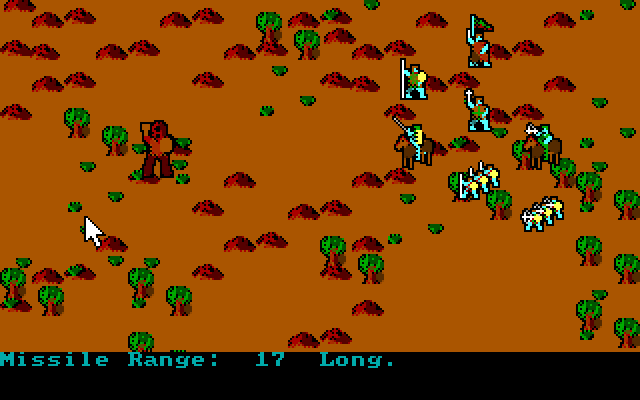
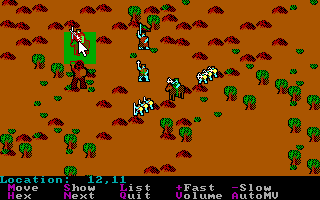

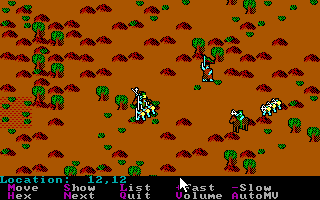

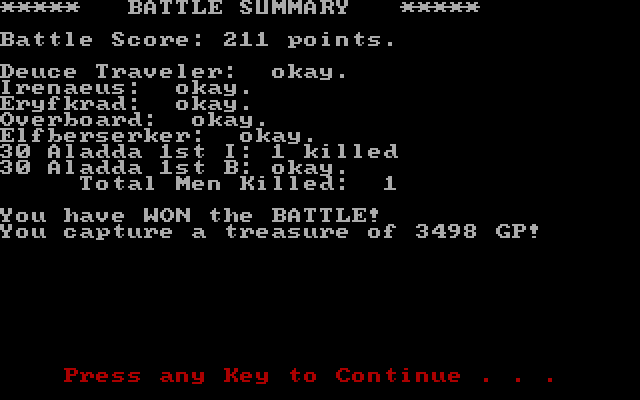

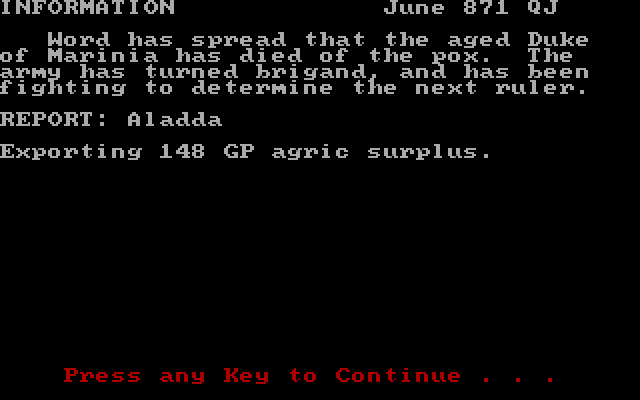
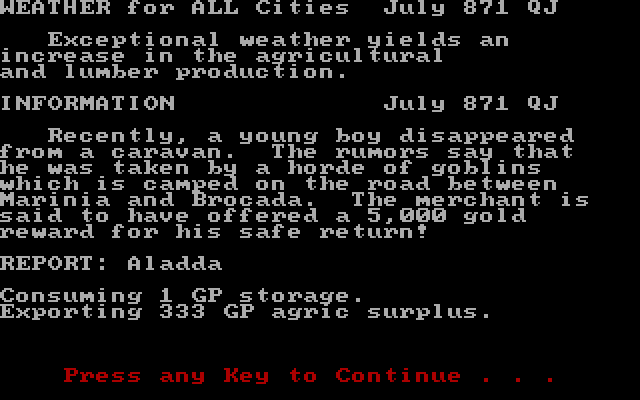
![Glory to Codexia! [2012] Codex 2012](/forums/smiles/campaign_tags/campaign_slushfund2012.png)


